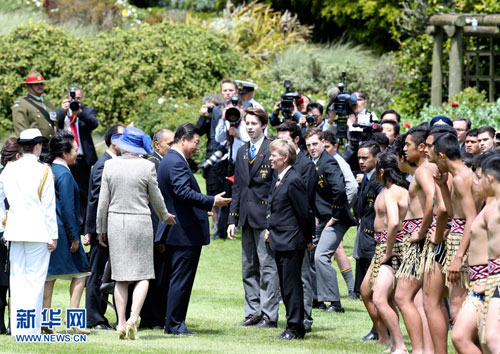国家主席习近平20日在惠灵顿出席新西兰总督迈特帕里举行的欢迎仪式。在总督府前草坪,新西兰政府首先为习近平主席到访举行隆重的毛利族传统欢迎仪式,这是新西兰人民给予尊贵客人的最高礼遇。下面我们就来为大家介绍欢迎仪式pōwhiri的几个重要环节:

11月20日,中国国家主席习近平在惠灵顿总督府出席新西兰总督迈特帕里举行的欢迎仪式。 新华社记者丁林摄
习近平和夫人彭丽媛抵达时,受到毛利族男女长者热情迎接。他们分别向习近平和彭丽媛行“碰鼻礼”。
Hongi(毛利碰鼻礼)
A hongi is a traditional Māori greeting in New Zealand. It is done by pressing one's nose and forehead (at the same time) to another person at an encounter.
碰鼻礼是新西兰毛利人的一种传统而又独特的见面问候方式。主人与客人双方的鼻尖与额头要同时轻碰。
It is used at traditional meetings among Māori people and on major ceremonies and serves a similar purpose to a formal handshake in modern culture.
碰鼻礼一般用在毛利人见面的传统场合,或者重要的仪式典礼,类似于现代文化礼仪中的握手。
毛利族人整齐列队,表演挑战仪式,这是毛利族最古老的迎宾礼。5名勇士赤膊光足,身系草裙,一面挥舞长矛,一面吆喝,并不时吐出舌头。为首的勇士走到习近平面前,将一把剑投在地上,习近平俯身拾起。毛利族人确定习近平一行是为和平而来的善者。
欢迎仪式序幕:Wero(挑战)
The ceremonial challenge called the wero or taki is an ancient warrior tradition of the Māori used to determine whether visitors came in peace or with hostile intent.
欢迎仪式(Powhiri)以挑战(wero/taki)为序幕,这是毛利人确定来访者是以和平为目的还是怀有敌意的古老传统。
The wero commences with the warrior advancing towards the visitors. He carries the rakau tapu(dart)tucked in his belt as he advances, flourishing a taiaha(wooden fighting staff).
挑战表演时,主人一方的勇士向客人提出挑战。这名勇士通常手持长矛(taiaha)向客人走去,腰间还掖着飞镖。
The warrior places the dart at the feet of President Xi. At a signal, President Xi moves forward and picks up the dart, all the while keeping his eyes on the warrior. Once the dart has been picked up, the warrior slaps his right thigh to signal that the visiting party may enter the area.
在本次欢迎仪式中,这位勇士将一把剑放在习近平主席的脚边,随后习近平俯身拾起,目光一直注视着这位勇士。随后,勇士拍右腿以示来宾可以进入。
毛利族女子引吭高歌,人群齐声欢呼,手舞足蹈,并用舌头、眼睛动作表达激动和喜悦之情。
Karanga(欢迎的吟唱)
The call of the karanga welcomes the visitors.
Karanga通常是高声呼唤或吟唱,用以欢迎来宾。(来客中的女宾们在经男宾前方步入会场时应做出回应。)
数十名毛利族青少年跳起传统的哈卡舞。
Haka Powhiri(哈卡战舞,欢迎舞)
President Xi, Madame Peng and the delegation are likened to passengers on a waka(ancient war canoe)that is about to come ashore. The Māori Welcoming Party performs a number of short haka imitating the hauling of the canoe ashore. The gestures of the body, tongue and eyes link with chanting to convey excitement and joy at the arrival of the Guests of Honor.
在欢迎舞仪式中,习近平主席、夫人彭丽媛、以及代表团的成员仿佛是乘坐在毛利人古代战时用的独木舟(waka)之上,独木舟即将靠岸。毛利欢迎团体表演几段简短的毛利族战舞(haka),模仿将独木舟拖拽上岸的过程,并用舌头、眼睛动作表达激动和喜悦之情。
(中国日报网英语点津 Julie)
